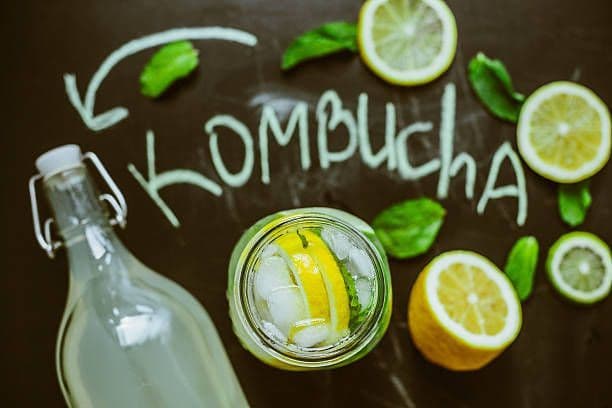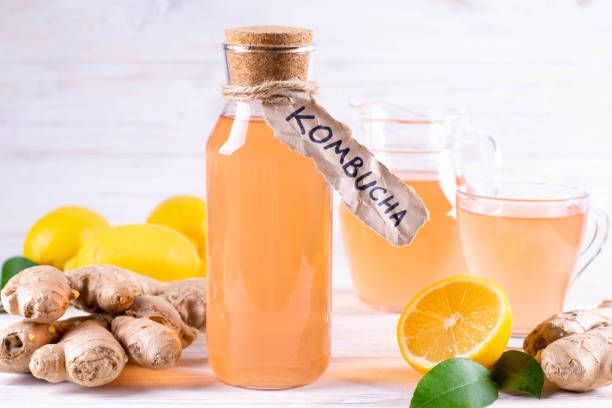
The Rise of Fermented Tea in Health and Wellness

Over the past few years, fermented tea has been on the rise in the health and wellness world. Fermented tea is rich in probiotics and antioxidants, which can promote gut health and boost immunity. But the main things is that is it permissible for Muslims or not?
Additionally, fermented tea has been shown to improve digestion, reduce inflammation, and fight cancer. With so many health benefits, it’s no wonder that fermented tea is becoming more popular each day. If you’re looking to try fermented tea, there are a few things you should know. In this blog post, we’ll cover everything you need to know about fermented tea, from its benefits to how to make it.
Fermented tea, such as kombucha, is becoming an increasingly popular drink for health and wellness. But what is it, and why is it becoming so popular?Fermented tea is a beverage that is made by fermenting black or green tea with a symbiotic culture of bacteria and yeast, or SCOBY. During the fermentation process, the bacteria and yeast convert the sugar in the tea into alcohol and carbon dioxide. This process produces a variety of beneficial compounds, including organic acids, B vitamins, and enzymes. The health benefits of fermented tea are thought to be due to the combination of the beneficial compounds produced during fermentation and the probiotics present in the SCOBY. Probiotics are beneficial bacteria that have been shown to have a number of health benefits, including improved gut health, reduced inflammation, and improved immune function. So why is fermented tea becoming so popular? There are a few reasons. First, fermented tea is a great source of probiotics, which are beneficial for gut health. Second, fermented tea is a great source of antioxidants, which can help reduce inflammation and oxidative stress. And third, fermented tea is a great source of B vitamins, which are essential for energy production and a healthy immune system.
What is Kombucha?
Kombucha is a fermented tea that has been consumed for centuries for its health benefits. The tea is made by adding a SCOBY (symbiotic colony of bacteria and yeast) to black or green tea, and sugar. The SCOBY consumes the sugar and tea and produces probiotics, acids, and enzymes that are beneficial for health.
What are the health benefits of Kombucha?
Kombucha has been shown to have many health benefits, including:
-Improved gut health-Reduced inflammation-Increased energy
-Improved mental clarity
-Reduced anxiety and depression
-Protection against cancer
-Improved joint health
-Reduced symptoms of arthritis
-Improved skin health
-Reduced symptoms of asthma
How do I make Kombucha?
To make Kombucha, you will need to:
1. Make tea. You can use black or green tea, or a combination of both. Steep tea for 5-10 minutes using 1-2 teaspoons of tea per cup of water.
2. Add sugar. Add 1-2 tablespoons of sugar per cup of tea. Stir to dissolve.
3. Add SCOBY. Add the SCOBY to the tea.
4. Cover jar. Cover the jar with a cloth cover and secure with a rubber band.
5. Let ferment. Let the tea ferment for 7-10 days. The tea will be ready when it has a sour, vinegary taste.
6. Store tea. Once the tea is ready, store in the refrigerator. The tea will keep for 2-4 weeks.
How do I drink Kombucha?
Kombucha can be enjoyed cold or hot. It can also be added to smoothies, juices, or cocktails.
The science of kombucha
Fermented tea, or kombucha, is a fizzy, acidic, and slightly sweet drink that has been consumed for centuries for its rumored health benefits.
But what is it about kombucha that has people so excited? And is there any truth to the claims?
To answer those questions, we need to take a look at the science of kombucha. Kombucha is a fermented drink, which means that a live culture of bacteria and yeast is added to the tea and left to culture for a period of time. During that time, the bacteria and yeast eat the sugar in the tea and produce lactic acid, carbon dioxide, and alcohol. The final product is a drink that is high in probiotics, antioxidants, and other beneficial compounds. Studies have shown that kombucha may have a number of health benefits. For example, it has been shown to improve gut health, boost the immune system, and fight inflammation. It may also help to detoxify the body and reduce the risk of cancer.
So is kombucha the miracle drink that some people claim it to be?
The answer is probably not. But that doesn't mean that it isn't a healthy and beneficial drink. Kombucha is a great source of probiotics, antioxidants, and other beneficial compounds, and it may offer some health benefits. So if you're looking for a healthy and refreshing drink, kombucha is a great option.
The rise of fermented tea in health and wellness
Fermented teas have been around for centuries, but have only recently begun to gain popularity in the western world for their potential health benefits. Kombucha, in particular, has become one of the most well-known fermented teas, and is said to have a wide range of health benefits, from improved digestion to increased energy levels. So, what is it about fermented teas that makes them so good for us? And what is the science behind the health claims? Fermentation is a process that breaks down complex carbohydrates and sugars into more simple molecules, which makes them easier to digest. This is why fermented teas are often recommended for people with digestive problems – the fermentation process helps to break down the food into smaller molecules that the gut can easily absorb. Fermented teas also contain probiotics – beneficial bacteria that help to keep our gut healthy. Kombucha, in particular, is a rich source of probiotics, which is one of the reasons it is often recommended for gut health. The science behind the health claims of fermented teas is still relatively new, and more research is needed to determine the full extent of their benefits. However, there is evidence to suggest that fermented teas can be beneficial for our health, and they are certainly worth exploring further.
Kombucha for muslims community?
Kombucha is a fermented tea that has been growing in popularity in recent years. Not only is it known for its health benefits, but it is also often marketed as a natural and organic alternative to traditional sodas and sugary drinks. However, for Muslims who follow halal dietary laws, the question of whether or not kombucha is considered halal is an important one.
The debate around the halal status of kombucha centers around the fermentation process. Kombucha is made by fermenting tea with a symbiotic culture of bacteria and yeast, known as a SCOBY. The fermentation process results in the formation of trace amounts of alcohol, which is haram (forbidden) in Islam. However, the amount of alcohol found in kombucha is typically very small, typically around 0.5% or less.
Some Muslim scholars argue that the small amount of alcohol found in kombucha is not enough to classify it as haram, and that the benefits of consuming kombucha outweigh the potential harm. They point out that the fermentation process also results in the formation of beneficial acids and enzymes, as well as probiotics, which can have a positive impact on the gut and overall health.
On the other hand, other Muslim scholars take a stricter approach, arguing that the presence of any amount of alcohol in a food or drink makes it haram. They argue that the fermentation process should be avoided in order to maintain the purity of the halal diet.
At the end of the day, the determination of whether or not kombucha is halal is ultimately up to individual interpretation and interpretation of Islamic laws. Some may choose to avoid kombucha altogether, while others may choose to consume it in moderation, taking into account the small amount of alcohol present and the potential health benefits.
In conclusion, the debate around the halal status of kombucha is ongoing. It is up to each individual Muslim to make an informed decision based on their own beliefs and understanding of Islamic dietary laws. It's worth noting that the question of whether or not kombucha is halal is a complex one, and it's always good to consult with an Islamic scholars or religious authorities before making a decision.
Appreciate the creator